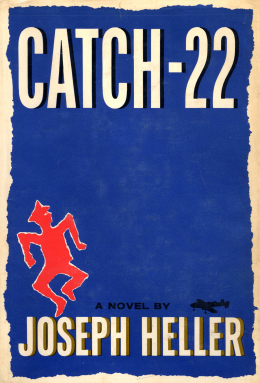In our earlier review of the movie, Catch-22, we noted, “The best way to get the most out of the movie Catch-22 is to first read the book. The best way to get the most out of the book Catch-22 is to first see the movie.” That isn’t necessarily true if you’ve experienced life in a large dysfunctional military organization, or just life is a large dysfunctional organization of any type. The book’s timeline is even more chaotic than the movie’s. There are many characters that reveal themselves in bits and pieces and you will sometimes wonder if you’ve missed something important. And all of that, I believe, is by design. Fear not, it is worth the effort. I’ll go through an arc that begins with Major Major, whom we’ve seen in the movie, touches on Major ––– de Coverly and First Lieutenant Milo Minderbinder, and ends with Captain John Yossarian.
— James Albright

Updated:
2024-05-13
As in the movie, Captain Yossarian learned that he can be grounded from flying combat missions if he is crazy, but only if he asks to be grounded. But if he asks to be grounded from flying combat missions, that proves he isn’t crazy, so he cannot be grounded. This catch, Catch-22, is woven through the Army Air Force in the story. Absurd? Maybe.
My first real experience with a large dysfunctional military organization was the Strategic Air Command (SAC) in the 1980s. Most bases had a Supervisor of Flying (SOF) program where a qualified Aircraft Commander would drive around the flight line and handle problems, often requiring interaction with the Wing Commander. At one of my bases, Major Tom Mayfield was a superstar. He was a great pilot, great officer, and someone the wing commander liked a lot. The only problem was that the wing commander would call him Tom Paulson, another pilot in our squadron. Paulson was a lousy pilot, lousy officer, and everyone hated him. The last thing Major Mayfield heard from the wing commander before his promotion board was, “Don’t worry about the board, Tom, you are getting promoted.” As you might have guessed, the wrong Tom got promoted. And that brings us to Major Major.
In the movie, Major Major was Captain Major Major and was promoted because the group had too many majors. In the book, Private Major was promoted by an IBM computer with a sense of humor. Having a major among privates in boot camp was a problem. But that was Major Major’s lot in life:
Major Major had been born too late and too mediocre. Some men are born mediocre, some men achieve mediocrity, and some men have mediocrity thrust upon them. With Major Major it had been all three. Even among men lacking all distinction he inevitably stood out as a man lacking more distinction than all the rest, and people who met him were always impressed by how unimpressive he was.
Major Major is elevated to Squadron Commander in the book, irking the squadron intelligence officer, Captain Black, who thought he should get the job. If you are the intelligence officer, after all, you must be more intelligent than officers who are not, well, intelligent. Captain Black started requiring all officers sign a loyalty oath before he would give them their map cases prior to missions, and he refused to let Major Major sign one, even if he wanted to:
Almost overnight the Glorious Loyalty Oath Crusade was in full flower, and Captain Black was enraptured to discover himself spearheading it. He had really hit on something. All the enlisted men and officers on combat duty had to sign a loyalty oath to get their map cases from the intelligence tent, a second loyalty oath to receive their flak suits and parachutes from the parachute tent, a third loyalty oath for Lieutenant Balkington, the motor vehicle officer, to be allowed to ride from the squadron to the airfield in one of the trucks. Every time they turned around there was another loyalty oath to be signed. They signed a loyalty oath to get their pay from the finance officer, to obtain their PX supplies, to have their hair cut by the Italian barbers.
Without realizing how it had come about, the combat men in the squadron discovered themselves dominated by the administrators appointed to serve them. They were bullied, insulted, harassed and shoved about all day long by one after the other. When they voiced objection, Captain Black replied that people who were loyal would not mind signing all the loyalty oaths they had to. To anyone who questioned the effectiveness of the loyalty oaths, he replied that people who really did owe allegiance to their country would be proud to pledge it as often as he forced them to.
In 1988 I was stationed at Offutt Air Force Base, Nebraska, which was a fine base except that it was home to Headquarters SAC and the Commander in Chief, Strategic Air Command (CINCSAC). One day, CINCSAC realized that officers only swear their oaths of officership when they are commissioned. So, he decided he would administer the oath of office to every officer on base. So, for the second time in my career, I took the officership oath, this time administered by a four-star general. At the time, I thought nothing of it. If they want to me to take the oath once a decade, why not? A month later, the next layer of command, led by a three-star general, decided all his officers would have to take the oath again. So, for the third time . . . You can see where this is going. My fellow squadron officers were irate at the huge waste of time. I found it all very funny. Our Glorious Oath Crusade died after about six months. It took that long because we didn’t have a savior willing to stand up against tyrants. In Catch-22, they had just such a man. Major ––– de Coverly, the squadron executive officer, had been away when the Glorious Loyalty Oath Crusade started and got into full swing. Captain Black’s mistake was to order First Lieutenant Milo Minderbinder, the mess hall officer, to require Major ––– de Coverly to take a loyalty oath before being served his meals.
Milo carefully said nothing when Major ––– de Coverly stepped into the mess hall with his fierce and austere dignity the day he returned and found his way blocked by a wall of officers waiting in line to sign loyalty oaths. The hubbub began to subside slowly as Major ––– de Coverly paused in the doorway with a frown of puzzled disapproval, as though viewing something bizarre. He started forward in a straight line, and the wall of officers before him parted like the Red Sea. Glancing neither left nor right, he strode indomitably up to the steam counter and, in a clear, full-bodied voice that was gruff with age and resonant with ancient eminence and authority, said: “Gimme eat.”
Instead of eat, Corporal Snark gave Major ––– de Coverly a loyalty oath to sign. Major ––– de Coverly swept it away with mighty displeasure the moment he recognized what it was, his good eye flaring up blindingly with fiery disdain and his enormous old corrugated face darkening in mountainous wrath.
“Gimme eat, I said,” he ordered loudly in harsh tones that rumbled ominously through the silent tent like claps of distant thunder.
Corporal Snark turned pale and began to tremble. He glanced toward Milo pleadingly for guidance. For several terrible seconds there was not a sound. Then Milo nodded. “Give him eat,” he said.
Corporal Snark began giving Major ––– de Coverly eat.
Major ––– de Coverly turned from the counter with his tray full and came to a stop. His eyes fell on the groups of other officers gazing at him in mute appeal, and, with righteous belligerence, he roared: “Give everybody eat!”
“Give everybody eat!” Milo echoed with joyful relief, and the Glorious Loyalty Oath Crusade came to an end.
Lieutenant Milo Minderbinder was an enterprising copilot who found himself with the job of “acting mess officer” and seized the opportunity to become the best acting mess officer in the Army Air Force. And to get rich by buying eggs in Malta for seven cents apiece and selling them at a profit in Pianosa for five cents. Of course, everyone in the group loves fresh eggs and soon every squadron on base gave Milo an airplane to fly around collecting fresh eggs and other culinary delicacies and all of it at a profit. The profit was for his syndicate, M & M Enterprises.
“Milo, how do you do it?” Yossarian inquired with laughing amazement and admiration. “You fill out a flight plan for one place and then you go to another. Don’t the people in the control towers ever raise hell?”
“They all belong to the syndicate,” Milo said. “And they know that what’s good for the syndicate is good for the country, because that’s what makes Sammy run. The men in the control towers have a share, too, and that’s why they always have to do whatever they can to help the syndicate.”
“Do I have a share?”
“Everybody has a share.”
“Well, I’ll be damned,” mused Yossarian, deeply impressed with the idea of a share for the very first time.
Captain John Yossarian is the bombardier who spends as much time as possible in the hospital because his meals were brought to him, there were extra rations of fresh meat, and no one ever disturbed him. He learned his ability to stay in the hospital as often as he pleased while in boot camp:
Yossarian owed his good health to exercise, fresh air, teamwork and good sportsmanship; it was to get away from them all that he had first discovered the hospital. When the physical-education officer at Lowery Field ordered everyone to fall out for calisthenics one afternoon, Yossarian, the private, reported instead at the dispensary with what he said was a pain in his right side.
They took Yossarian’s clothes away and put him in a ward, where he was very happy when no one was snoring nearby. In the morning a helpful young English intern popped in to ask him about his liver.
“I think it’s my appendix that’s bothering me,” Yossarian told him.
“Your appendix is no good,” the Englishman declared with jaunty authority. “If your appendix goes wrong, we can take it out and have you back on active duty in almost no time at all. But come to us with a liver complaint and you can fool us for weeks. The liver, you see, is a large, ugly mystery to us. If you’ve ever eaten liver you know what I mean. We’re pretty sure today that the liver exists and we have a fairly good idea of what it does whenever it’s doing what it’s supposed to be doing. Beyond that, we’re really in the dark. After all, what is a liver? My father, for example, died of cancer of the liver and was never sick a day of his life right up till the moment it killed him. Never felt a twinge of pain.”
The book starts and ends with Yossarian in the hospital. During one of his visits, this time from a flak wound, he finds himself about to be operated on:
“Cut,” said a doctor.
“You cut,” said another.
“No cuts,” said Yossarian with a thick, unwieldy tongue.
“Now look who’s butting in,” complained one of the doctors. “Another county heard from. Are we going to operate or aren’t we?”
“He doesn’t need an operation,” complained the other.
“It’s a small wound. All we have to do is stop the bleeding, clean it out and put a few stitches in.”
“But I’ve never had a chance to operate before. Which one is the scalpel? Is this one the scalpel?”
“No, the other one is the scalpel. Well, go ahead and cut already if you’re going to. Make the incision.”
“Like this?”
“Not there, you dope!”
“No incisions,” Yossarian said, perceiving through the lifting fog of insensibility that the two strangers were ready to begin cutting him.
“Another county heard from,” complained the first doctor sarcastically. “Is he going to keep talking that way while I operate on him?”
“You can’t operate on him until I admit him,” said a clerk.
“You can’t admit him until I clear him,” said a fat, gruff colonel with a mustache and an enormous pink face that pressed down very close to Yossarian and radiated scorching heat like the bottom of a huge frying pan.
“Where were you born?”
“On a battlefield,” he answered.
“No, no. In what state were you born?”
“In a state of innocence.”
“No, no, you don’t understand.”
They gave Yossarian total anesthesia and knocked him out. A hand with sharp fingers shook him awake roughly. He turned and opened his eyes and saw a strange man with a mean face who curled his lip at him in a spiteful scowl and bragged, “We’ve got your pal, buddy. We’ve got your pal.”
Yossarian turned cold and faint and broke into a sweat.
When you figure out how Milo buys eggs for seven cents and sells them for five cents at a profit, and when you figure out who’s Yossarian’s pal, you will have Catch-22 figured out. For me, it took two readings of the book. I think with these few hints, if you see the movie first, you might crack the code after your first reading.
I believe the book Catch-22 not only served as a warning for much of what I saw during my twenty years in the Air Force, it helped me deal with the more absurd situations. Life, as fiction, can be funny and sad at the same time. If you’ve spent any time in any military, I think the book will resonate with you. If you’ve spent any time working for a large bureaucracy, you will probably learn to appreciate that what we saw in the military has spread to the civilian world as well. Or maybe it started in the civilian world and spread to the military?

